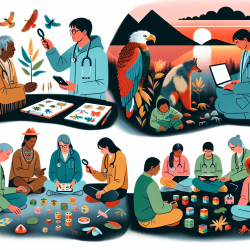Introduction
In the realm of environmental research, the integration of Indigenous knowledge and perspectives is gaining recognition as a crucial component for achieving meaningful outcomes. The research article titled "Are the natural sciences ready for truth, healing, and reconciliation with Indigenous peoples in Canada? Exploring ‘settler readiness’ at a world-class freshwater research station" provides valuable insights into how environmental scientists and practitioners can improve their skills by engaging with Indigenous communities. This blog explores the key findings of the study and offers guidance for practitioners seeking to enhance their practice through collaboration and reconciliation.
Understanding the Research Context
The study focuses on the International Institute of Sustainable Development-Experimental Lakes Area (IISD-ELA) in Northwestern Ontario, Canada. This research station, located on traditional Anishinaabe territory, has historically excluded Indigenous peoples from its governance and research processes. However, following the Truth and Reconciliation Commission's Calls to Action, the IISD-ELA initiated efforts to develop relationships with local Indigenous communities.
Key Findings and Implications
The research identified several barriers to meaningful engagement, including time constraints, resource limitations, and a lack of cultural awareness among staff. Participants acknowledged the need to engage Indigenous knowledge holders and embrace their ways of knowing. These findings highlight the importance of cultural sensitivity and the integration of Indigenous perspectives in environmental research.
Implementing the Research Outcomes
Practitioners can enhance their skills by implementing the following strategies based on the research outcomes:
- Engage in Cultural Sensitivity Training: Understanding the cultural and historical context of Indigenous communities is essential for meaningful collaboration. Practitioners should seek opportunities for cultural sensitivity training to enhance their awareness and understanding.
- Build Relationships with Indigenous Communities: Establishing genuine relationships with Indigenous communities requires time and effort. Practitioners should prioritize building trust and engaging in open dialogue to foster collaborative partnerships.
- Integrate Indigenous Knowledge: Recognize the value of Indigenous knowledge systems and incorporate them into research and practice. This involves acknowledging Indigenous perspectives and involving knowledge holders in decision-making processes.
- Advocate for Resources and Support: Addressing resource limitations is crucial for successful engagement. Practitioners should advocate for increased funding and support to facilitate meaningful collaboration with Indigenous communities.
Encouraging Further Research
The study underscores the need for continued research into Indigenous-settler relations and the integration of Indigenous knowledge in environmental science. Practitioners are encouraged to explore further research opportunities and contribute to the growing body of knowledge in this area.
Conclusion
By implementing the outcomes of this research, practitioners can improve their skills and contribute to positive outcomes for both environmental science and Indigenous communities. Embracing reconciliation and collaboration is essential for creating a more inclusive and effective practice.
To read the original research paper, please follow this link: Are the natural sciences ready for truth, healing, and reconciliation with Indigenous peoples in Canada? Exploring ‘settler readiness’ at a world-class freshwater research station.










